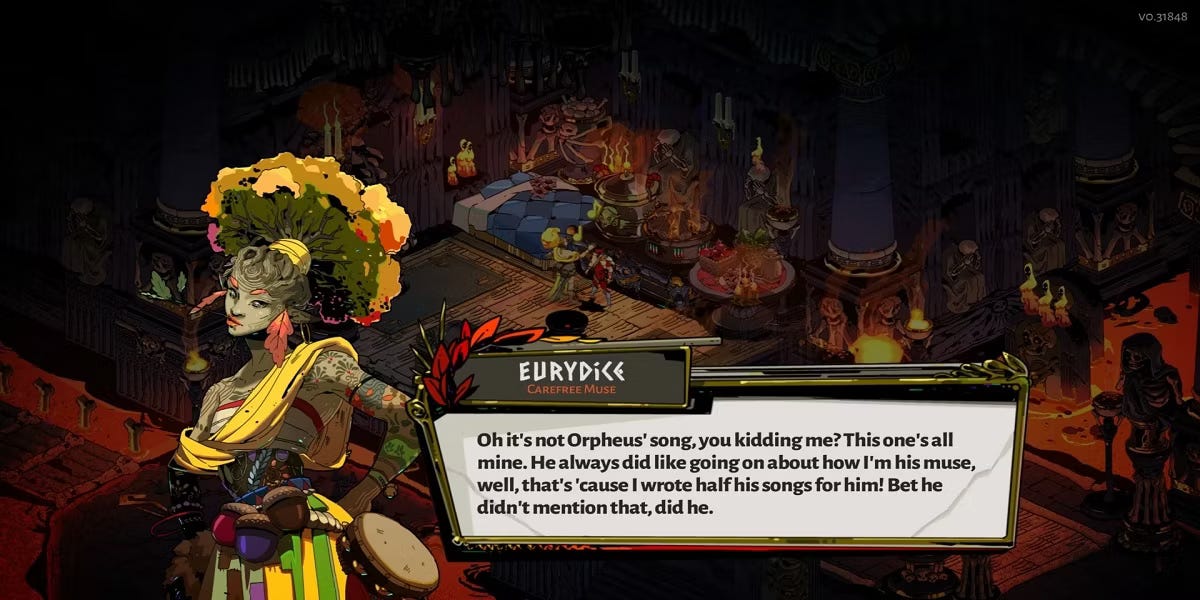Reception Radio: Good Riddance (Eurydice Solo), from Hades
A tragic muse in her own words
Last week on Reception Radio, I shared Hades’ take on Orpheus and his signature song. The game also stars his lover Eurydice, and she has her own song to sing.

I absolutely love how the Hades creative team made Eurydice a musician in her own right. Sure, she’s Orpheus’ muse, but there’s a lot more to her character here. When players first encounter her in the game, she’s hanging out in a peaceful corner of the Underworld, singing her signature tune, Good Riddance. The game takes some time to reveal the connection between her and Orpheus, letting the player get to know her as an individual first. This Eurydice has a knack for cooking, enjoys her creature comforts, and seems quite happy to live solo. The lyrics of her signature song reflect this independence: they’re all about untethering from negative forces in her life, and being at peace after some unspecified turmoil. The afterlife’s clearly treating her well.

This peace doesn’t last forever. Eurydice’s tragic past comes back to haunt her when she learns that Orpheus has died and come to the Underworld, and that he’s still pining and mourning her loss. She’s initially reluctant to see him; she’s got some complicated feelings about the guy. I don’t blame her: imagine being in her place!
I absolutely love the in-game reveal that Eurydice wrote many of Orpheus’ songs. So many women across history have produced and contributed to incredible artwork, only to have a man (sometimes their life partner) take credit for it, or fail to acknowledge their talent. In this light, Hades’ version of Eurydice reads like an acknowledgement of women’s labour across time, and a deliberate complication of the idea of the artist’s muse. Yeah she inspires a man’s life-work, but who is she on her own terms?

Interestingly, Eurydice’s signature song involves less of a direct connection to myth than what Orpheus sings. It also sports a different sonic palate; Lament of Orpheus features layers of sound and eerie modulations on the vocals, while Good Riddance is a spare track made of little more than some lyre-esque plucked strings and Ashley Barrett’s stellar voice (how fitting to give a vocal-centric track to a character who often doesn’t get a chance to speak!). This pared-back musical approach is a fitting match for Eurydice’s character in Hades. She’s pragmatic and direct in a way that both contrasts and complements Orpheus’ head-in-the-clouds personality.
I would be remiss if I didn’t mention how Eurydice’s story ends in Hades. She realizes that she still harbours feelings for Orpheus, despite everything, and the two reunite in the Underworld. This ending might seem trite or forced in any other story, but I promise that Hades makes it work. Orpheus goes through a character arc where he learns to respect Eurydice’s independence, and see her as not a muse, but a fellow artist. There was clearly some thought put into making their love story feel nuanced and real: both characters have to work through their feelings before they see each other again. When they do reunite, Orpheus comes and goes, giving Eurydice space to live alone when she wants. They also sing a duet version of her signature tune… but that’s a song for another day.
Here are the Spotify and YouTube links for Good Riddance:
Lyrics:
Farewell
To all the earthly remains
No burdens
No further debts to be paid
Atlas
Can rest his weary bones
The weight of the world
All falls away
In time
Goodbye
To all the plans that we made
No contracts
I'm free to do as I may
No hunger
No sleep except to dream
Mild and warm
Safe from all harm
Calm
Good riddance
To all the thieves
To all the fools that stifled me
They've come and gone
And passed me by
Good riddance
To all
Farewell
To all the earthly remains
No burdens
No further debts to be paid
Atlas
Can rest his weary bones
The weight of the world
All falls away
In time


This song is so pretty. Good for her